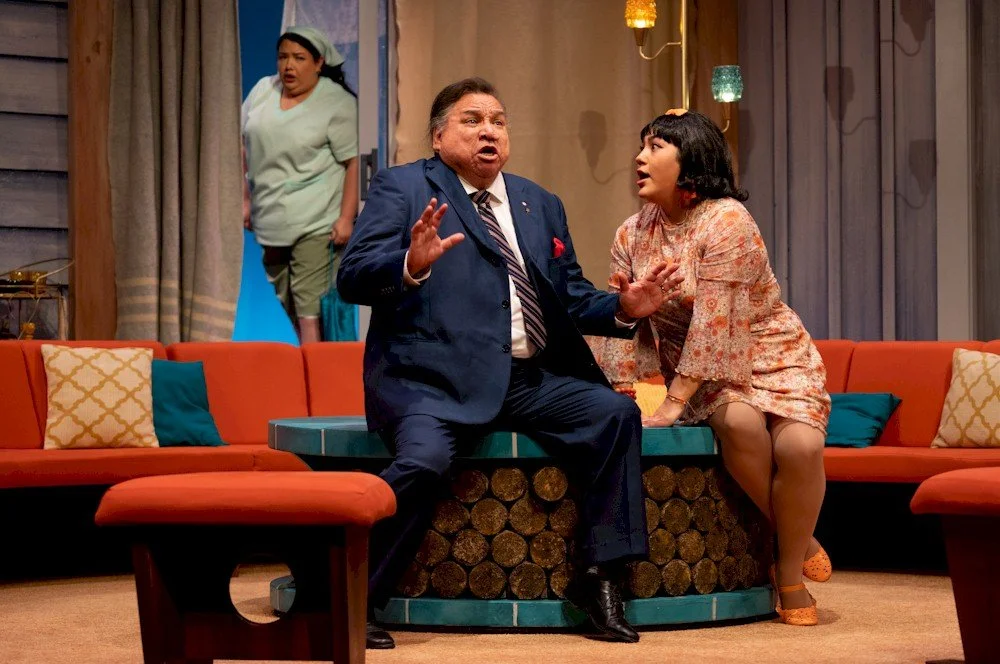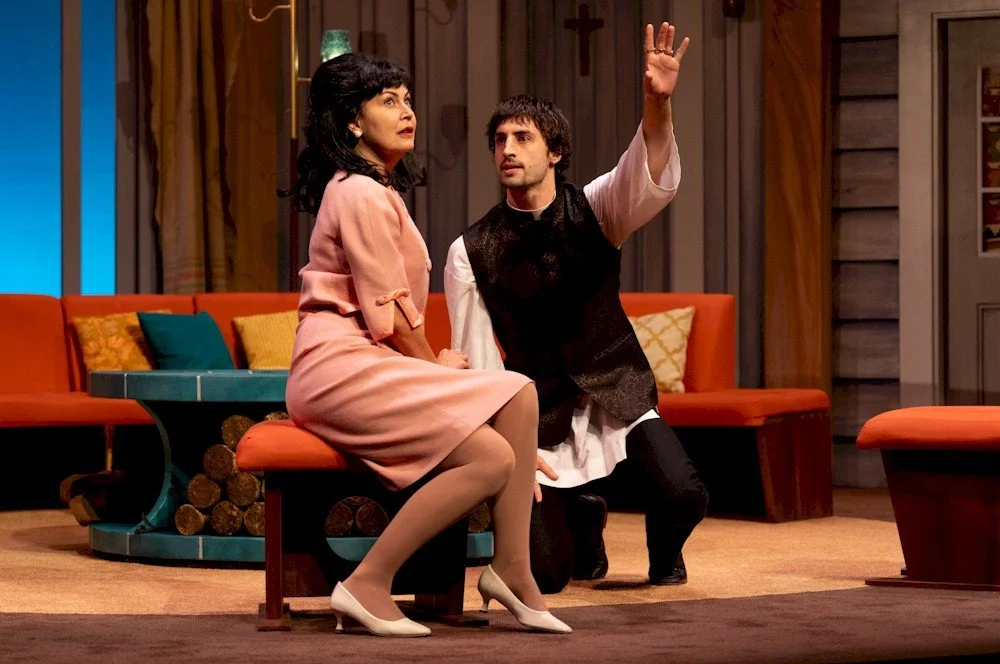Theatre review: A strong cast finds all the comedy and complexity in Father Tartuffe
Relocating Molière’s farce to a 1967 “rez mansion”, play moves entertainingly between big laughs and deeper reflection
Samantha Alexandra, Sam Bob, and Danica Charlie in Father Tartuffe. Photo by Moonrider Productions
The Arts Club Theatre Company and Touchstone Theatre present Father Tartuffe: An Indigenous Misadventure at the Granville Island Stage to March 24
THE TRANSFORMATIVE UPROAR of the late 1960s—marked by civil rights marches, women's liberation rallies, anti-war protests, and decolonization movements around the world—forms the backdrop for this new adaptation of Molière's 1664 comedy Tartuffe.
Infusing new and nuanced vitality into the play's critique of societal norms, this Arts Club Theatre and Touchstone Theatre coproduction of Father Tartuffe: An Indigenous Misadventure features a talented cast, and brings an original, heartfelt, and deeply relevant Indigenous lens to the classic.
The year 1967 was a big deal for Canada, charged with the excitement of hosting the International Expo in Montreal as well as a Centennial celebration. This period of national pride came just seven years after Indigenous peoples were given the right to vote and was still decades away from the end of federally-funded residential schools.
Set against this historical backdrop, we meet Orin (Sam Bob) and his family, whose lives have been elevated to greater comfort thanks to a government job related to Expo 67. The newfound prosperity, however, also attracts the grabby Father Tartuffe (Aidan Correia), a self-proclaimed holy man whose sanctimonious words and false piety deceive only Orin. To everyone else, Tartuffe's motives are clear. Yet, Orin, in his unwavering trust, unknowingly endangers his family's safety, motivated to conform to Tartuffe’s dangerous guidance.
The misadventure unfolds in the family's newly expanded and renovated home, which they affectionately dub a “rez mansion”. From the get-go, the narrative plunges into themes of transformation—spanning economic, cultural, communal, and personal realms—all wrapped in a humour that grounds the topics through the family’s lively squabbles. Tensions bubble up immediately.
The grandmother, portrayed by the commanding and hilarious Marshall Vielle, opens the play with a booming voice. She speaks in the original play's rhyming couplets to school her family members on “proper” English and criticizes their “Indian ways”. The others humorously and begrudgingly try to follow suit, but it doesn’t take long for Maryanne, the young daughter, brought to life with sunny, hormone-charged energy by Danica Charlie, to disrupt the rhythm.
Maryanne and her relationship with a Métis boy (Frankie Cottrell), who her father says is only “half as good as he needs to be”, isn’t the only thing posing a challenge to her granny’s and father’s aspirations of fitting into white society. There’s the son Dennis (Braiden Houle), a vocal counterculturalist; Orin’s sister, Cathy (Cheri Maracle), who has adapted to city life but defies expectations as an unmarried, working woman; and Darlene (Samantha Alexandra), the smart, sarcastic auntie perpetually eavesdropping and raising her brow, never afraid to speak her mind,even if it means arguing with her brother-in-law (whose roof she lives under) in Obijwe.
There are many compelling characters to focus on, not least of all Orin, a figure Molière himself didn't sympathize with much. Here, like in the original, the patriarch, gleefully under Tartuffe’s spell, consistently ignores his family’s warnings. He’s often bumbling, a disastrous walking combination of poor judgment and stubborn determination (not far from sitcom dads like Homer Simpson). But there’s also an underlying sadness and earnestness about him, which actor Sam Bob colours with natural gentility and humanism, especially when we learn more about the character’s past—a direct legacy of residential schools.
Quelemia Sparrow and Aiden Correia in Father Tartuffe. Photo by Moonrider Productions
The women in this play are equally complex, and it’s unsurprising to discover that Quelemia Sparrow, who portrays Odin’s steadfast wife, Elise, also codirects the play (with Roy Surette). Constrained by their era yet often the ones left to clean up the messes, the women wield a subversive power, often collectively. Their resilience is underscored by Aretha Franklin's anthemic “Respect”, as well as powerful lines that pierce deeply, like Elise's protest to Tartuffe's sexual harassment and self-righteous shaming: “No one is the governor of my body—I am unceded.”
As for the titular villain, nothing can prepare you for this portrayal. Correia’s highly physical and unhinged performance leaves behind any idea of a dull clergyman.
The script creatively adapts the original's format, infusing it with a distinctly Canadian and Indigenous perspective that's often self-referential or punny. The humour also embraces camp and high jinks, with only the occasional misstep—say, the sometimes awkwardly executed homoerotic undertone between Orin and Tartuffe. Still, the comedic risks are welcome, and there’s not much the talented ensemble of actors and their palpable chemistry can’t make funny.
Costume designer Jolane Houle brings the characters’ contrasting quirks to life, from Elise and Maryanne’s shellacked beehives to Cathy's sleek power suit or Odin’s practical clip-on tie. Ted Roberts’s set crafts one big, retro-60s space where all the idiosyncrasies interact. And a bunch of doors, constantly opening and slamming shut, are a visual reminder not only of the play’s roots in farce, but of the complex and vital sense of community that binds together the household and the reservation it resides in.
Lit by the spirited energy of the '60s and a unique flair of humour, playwright Herbie Barnes’s take on Tartuffe is a celebration of indigeneity that echoes into the present. The cast is a sheer joy to watch—eliciting laughs one moment and sparking reflection the next, making us question just how far society has really come. Or hasn’t. ![]()














